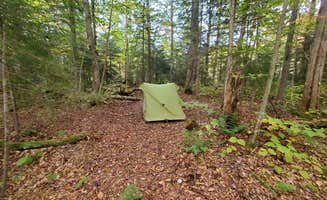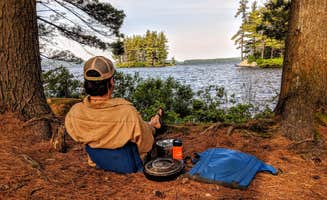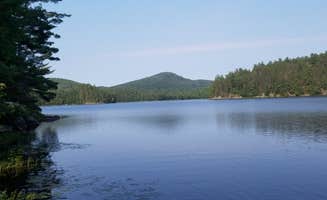Primitive camping options surrounding Rainbow Lake in New York provide direct access to the remote Adirondack wilderness. The northern Adirondack region features several accessible lakes and ponds at elevations between 1,500-1,700 feet, creating cooler summer temperatures than surrounding lowlands. Winter conditions typically restrict access from November through April with heavy snowfall accumulations.
What to do
Paddling excursions: Little Green Pond offers excellent water access with 12 designated camping spots situated directly on the pond. Some sites require navigating "a bumpy access road that can be muddy after a rain," according to Lo M., who appreciates that "sites are on the Pond" which "has a small beach to swim."
Hiking opportunities: Ward Brook Campsite provides a strategic base for hikers tackling Seymour Mountain. Alex R. notes it offers "a nice lean-to" with "a fire pit, picnic table, and a privy," plus "a bit further you will find some tent spots too." The location serves as a practical starting point for day hikes or multi-day backpacking routes.
Fishing spots: Several ponds in the region contain native brook trout and stocked species. The stone cliff at Crane Pond Dispersed Site creates a prime fishing location. Nicole T. describes it as "great for fishing" with "a stone area right by the water if you want to fish or just sunbathe."
What campers like
Complete disconnection: Polliwog Lake provides an authentic wilderness experience with minimal technological distractions. Debbie T. reports camping there for "a few days, no cell, no internet," creating an opportunity for genuine outdoor immersion.
Island camping: Cranberry Lake Backcountry Sites offers island-based camping accessible only by watercraft. Shari G. enthusiastically reports, "We spent 3 nights backcountry camping on Catamount Island in Cranberry Lake and absolutely loved it! The sunsets from the island were truly incredible." Each site includes basic amenities: "a picnic table and fire ring."
Wildlife viewing: The lakes and ponds host diverse Adirondack wildlife. Nicole T. mentions hearing and seeing loons at Crane Pond, noting, "at night you can hear the loons (visible during the day as well)." The region's wetlands attract numerous bird species throughout warmer months.
What you should know
Road conditions: Access roads to dispersed sites often require appropriate vehicles. For Crane Pond, Nicole T. warns, "Crane Pond Road from the lower parking lot to the pond itself is NOT maintained and often gets very muddy. 4WD is required, if you go back there without it your day is gonna suck."
Water treatment: Surface water requires proper filtration before consumption. Shari G. advises Cranberry Lake visitors to "bring your own potable water or filter from the lake, so don't forget your water filter."
Designated site limitations: Horseshoe Lake provides limited designated camping options. Rebecca B. reports, "Along Co 421, by Horseshoe Lake, there are 10-11 designated campsites. Most have fire pits." Access requires careful driving as "Road is rough but easily doable if you take it slow."
Tips for camping with families
Swimming access: Many dispersed sites provide water access for swimming. Little Green Pond features "tree covered sites" with a "small beach to swim," according to Lo M., making it suitable for families with children who want water activities.
Insect preparation: Biting insects can be problematic during summer months. Shari G. warns that while "the mosquitoes weren't bad at the campsite itself or while kayaking, they are terrible on the trails this time of year; so bring your bug spray, or better yet, bug shirts!"
Supply limitations: Remote free camping near Rainbow Lake, New York requires careful meal planning. Shari G. notes that "The Village of Cranberry Lake has some supplies, but not much except the very basics at the general store. You'll need to head to Star Lake or Tupper Lake for anything of significance."
Tips from RVers
Site limitations: Most dispersed areas have restricted RV access. Nicole T. cautions that Crane Pond Road is "Not fit for an RV in any capacity" due to rough terrain and limited turning space.
Solar challenges: Dense forest cover impacts power generation options. Rebecca B. notes that at Horseshoe Lake, "As it's a forest, the sites are pretty shaded, so solar and Starlink may present challenges."
Connectivity issues: Most free camping near Rainbow Lake lacks reliable cellular service. Rebecca B. reports "Slight AT&T at earlier sites" at Horseshoe Lake, while most other areas have no connectivity at all, requiring preparation for offline navigation and emergency planning.




